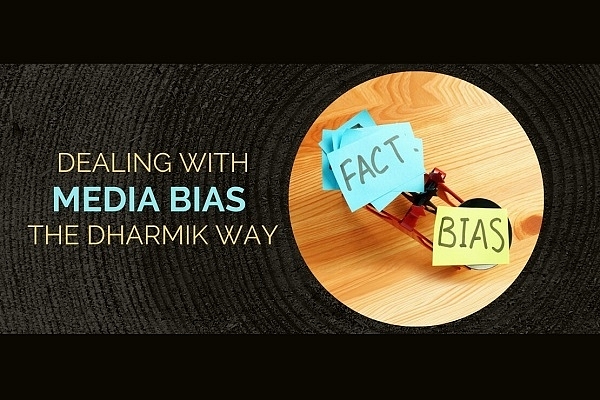Insta
Dealing With Media Bias - The Dharmik Way: New Indica Course To Critically Analyse Impact Of Media On Our Life-Choices

Dealing With Media Bias – The Dharmik Way
Media function in a context. Media are consumed in a context. The context of creation aims to widen its audience, to generate profits. The context of consumption is often dominated with the idea of entertainment, collective family viewing, and sometimes education and/or information.
What happens when the two contexts interact? Is the result always for our best interests? Can we become a more discerning, critical consumer of media content? How can we use the understanding of Purusharthas to regulate our media consumption?
The Indica Course "Dealing With Media Bias – The Dharmik Way" brings together media theories and a basic understanding of Purusharthas (four goals or strivings of human life) to critically analyse media messages, media consumption and its impact on our life-choices.
Introduction
This Indica Course is for anyone interested in learning about how media technology and media content impact our daily lives.
Media industry in India, since liberalization of the economy in the 1990s, has changed enormously. The youth of today have no experience of a time when consumers had a choice to turn off media messages simply by turning off radio/television in their living room. Due to media ubiquity, those who do remember times before mobile media, may still not be able to turn off/away from media content.
Although it is a common understanding that media is constantly ‘selling’ through advertisements, the messages embedded in stories are consumed without much resistance.
Do we contemplate the impact of collective consumption of repetitive messages?
Do we understand that allowing electronic storytellers to replace grandmothers and parents limits the stories that we pass on to the next generation?
In this class we will discuss mediatization of our lives—when we live through media, whether consuming entertainment media content, at work place communicating via emails or forwarding WhatsApp messages to family members and how to make sense of it in the context of four purusharthas.
Learners will be given homework for self-reflection and study and tools for being a critical consumer of media content.
Objectives
The main objective of this Indica Course is to understand that media content and use of media technology is food for the mind. It is our responsibility to expose ourselves to the content that aids in our personal, professional and spiritual development.
Expected Outcomes
To define and identify media and mediatization
To become a discerning consumer of media
To identify and describe (some) media theories that relate to media consumption
To discuss media messages in the context of purusharthas
Syllabus
Introduction to media. What is media? How to Identify it in our lives?
Old and New: Media theories & concepts
Media, Mind and Us: Chakras & Three Gunas
Media Messages and Their Inspiration (Dharma &/Vs. Religion)
Kama: A misunderstood purushartha
Vyavharika and Parmarthika: Artha & Moksha
Review, Summary, Question & Answer session, sharing reflections, & discussion
Suggested Reading List
Hjarvard, S, & Petersen, L. N. (2013). Mediatization and cultural change. MedieKultur: Journal of media and communication research, 29(54), 7-p
Malhotra, R. (2007). Being Different An Indian Challenge To Western Universalism. HarperCollins
McLuhan, M., & Mcluhan, M. A. (1994). Understanding media: The extensions of man. MIT press
Postman, N. (2003). Technopoly. Bollati Boringhieri, Torino
Postman, N. (2006). Amusing ourselves to death: Public discourse in the age of show business. Penguin
Potter, W. J. (2013). Synthesizing a working definition of “mass” media. Review of Communication Research, 1, 1-30
Zimmer, H. (2013). Philosophies of India. Routledge
Support Swarajya's 50 Ground Reports Project & Sponsor A Story
Every general election Swarajya does a 50 ground reports project.
Aimed only at serious readers and those who appreciate the nuances of political undercurrents, the project provides a sense of India's electoral landscape. As you know, these reports are produced after considerable investment of travel, time and effort on the ground.
This time too we've kicked off the project in style and have covered over 30 constituencies already. If you're someone who appreciates such work and have enjoyed our coverage please consider sponsoring a ground report for just Rs 2999 to Rs 19,999 - it goes a long way in helping us produce more quality reportage.
You can also back this project by becoming a subscriber for as little as Rs 999 - so do click on this links and choose a plan that suits you and back us.
Click below to contribute.
Latest